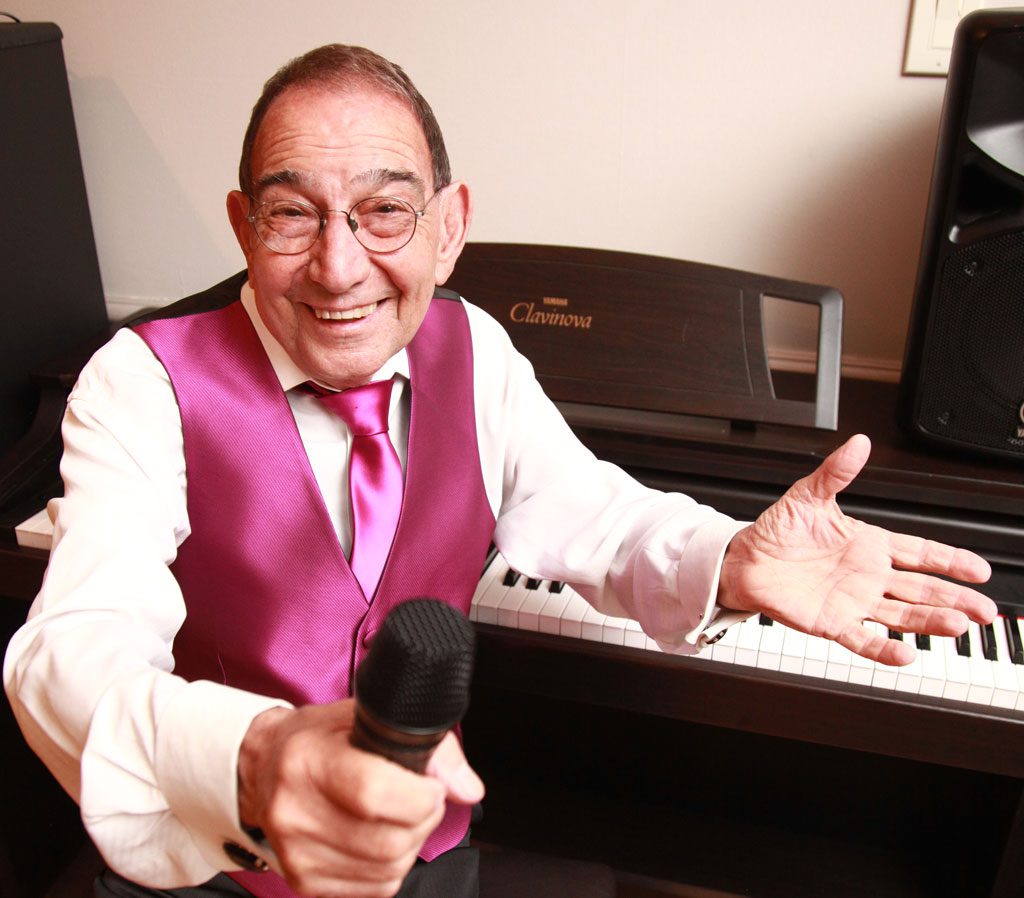
[dropcap]If[/dropcap] he and his longtime musical partner Joey Harlan had just gotten a good break or two, had been at the right place at the right time, Luigi Balletto believes “we would’ve been the biggest thing you ever heard of.”
Looking back, he’s glad they weren’t.
“I have an addictive personality, like a lot of people,” the veteran vocalist says. “If I had made it big while Joey and I were together – and we were good enough to make the big time – I would’ve gotten involved with the wrong kind of people and drugs and booze. I would be dead. I know that. And I’m just so grateful that I’m alive.”
Not only is he alive; he’s also working more than ever. In a time when many area musicians have to hustle just to find a decent weekend gig, Luigi – who recently celebrated his 80th birthday – plays 30-40 dates a month. And while he has a regular engagement at the Tulsa Elks Lodge that begins at dinnertime and goes three-and-a-half hours straight, most of his appearances clock in around an hour, not counting 30 minutes each for set-up and tear-down. Some are morning shows, some afternoon, some early evening. Many are on Saturdays and Sundays. And most of them take place in retirement and assisted-living centers and nursing homes, where audience members tend to be in the neighborhood of Luigi’s age bracket, sharing knowledge of the music he performs.
“They know all the songs,” he says. “They know the Broadway stuff. I mean, I don’t do anything rinky-dink. I do a Vegas show for them. I do Sinatra. One show I did not too long ago, I did Sinatra, had the Sinatra hat. I did Dean Martin. And I got a wig and did Willie Nelson.” He laughs. “Some people just go up and sing. I give them a performance.”
Luigi has performed for some 70 years, beginning in his native Toronto, where he first got paid for singing when he was 10 years old. Five years later, he remembers, “I sang with the biggest band in Canada, Leo Romanelli’s band. And then I went on the road. I came to the States with a group, but we only lasted a year. That was in ’55. In ’57, I met Joey. He and I were with the same agency.
“I played drums. He was a concert pianist. He sang like Nat King Cole. I did Sinatra. He was a voice person – he directed quartets, barbershop quartets and studied music in college. But he was very shy. We made it because what he gave me musically on the keyboard I gave back personality-wise.”
As Joey & Luigi, the two “played everywhere – I mean, we played Ishpeming, Michigan,” Luigi says with another laugh. “Then, in 1963, we’re in Joplin, Missouri, at Mickey Mantle’s Holiday Inn, and in comes John Hoyt from Hoyt Oil Company and Dr. [Tom] Burris, who was a big-time dentist in Bartlesville. They had bought the lease to the Red Lion Room, which was going to be in the Camelot Hotel, then being built in Tulsa. They were looking for somebody to open it up. They’d heard about us, so they came in, saw us, and we signed a contract for a year and a half.”
Neither performer had played, or even visited, Tulsa, but once they got to town Joey & Luigi became staples of the live entertainment scene, playing regularly at the Red Lion Club for the next decade as well as appearing in many other local and regional venues.
“Then Joey, who’s nine years older than me, retired and went to Florida,” Luigi recalls. “He bought some property there and made millions. He’s 89 and still directs the choir at his Unitarian Church.”
I take that microphone, and I go right to them, and they look at me like they’re 25-year-old bobby-soxers and I’m Frank Sinatra.”
Meanwhile, back in the Tulsa area, Luigi continued as a single, eventually getting involved in the ownership and management end of the nightclub business in addition to performing. It wasn’t always easy, and by the 1990s, by his own admission, Luigi was “in real bad shape.”
“I didn’t think I would live past 60, with the booze and the other bad things,” he says. “I had lost my voice. Then one night the Lord came to me in my sleep and said, ‘I’ll give you one more chance.’ I quit drinking and smoking the next day. My whole life changed.”
It changed again a decade ago, when he received a call from Montereau, a Tulsa retirement community.
“This lady says, ‘Luigi, I’ve never heard of you, but the residents remember you from the Camelot, the Red Lion Room. They’ve been asking me if you’d be willing to come down and do a show. What’s your price?’”
He told her and, not long afterwards, Luigi played his first retirement-home gig.
“I had my really big equipment back then, my big 50-pound speakers, and after taking all that down there I said, ‘I really can’t do this anymore,’” he says. “But then, when I was there, I saw this karaoke machine. I asked the guy who had it what it was, and he showed me, and I said, ‘I could do that.’ So I went out and got one.”
Since then, he’s amassed a collection of thousands of backing tracks on CD, making it relatively easy for him to tailor shows to specific audiences.
Montereau asked him back – he continues to play there regularly – and word got out to other homes and senior-living centers about how suited Luigi was for their entertainment needs. The phone kept ringing, and, for the first time in a long life of entertaining people, he didn’t have to go out and beat the bushes for jobs. A decade later, they’re still coming, and he’s loving the situation – for a couple of reasons.
“First, I’m singing better now than I did when I was 20, 30, 40 or 50,” he says. “I love to get out there and sing ‘Come Fly With Me’ and hear an 80-year-old voice that’s right on. But the best thing about it is seeing the people’s faces and hearing their applause. I take that microphone, and I go right to them, and they look at me like they’re 25-year-old bobby-soxers and I’m Frank Sinatra.”
These engagements testify not only to the way music can melt years away, but also to its healing properties. Luigi has stories of playing Alzheimer’s units in front of people who haven’t moved for months, and seeing some of those same patients tap their feet and even sing along.
His best story, however, involves a woman in a center who became one of Luigi’s biggest fans, inevitably requesting he sing the pop standard “Just A Gigolo.” One day, her daughter, a retired nurse, called him.
“She said, ‘Mother’s had a stroke, and I had to bring her to my house. She has three days to live. She’s on hospice care, no water, no food. As far as we’re concerned, she’s gone. Would you come over and say goodbye to her?’”
When Luigi arrived, he found the woman’s other children gathered there, in from all across the country.
“She was lying in a bed in the dining room,” says Luigi, his voice cracking for a moment. “I go over, kiss her on the cheek, say, ‘Baby, this is for you,’ and I start singing ‘Just A Gigolo.’ Her eyes pop open – and she sits up. Then, she looks around the room and says, ‘Kids, what are you doing here?’”
That was two years ago, and the woman is not only still with us, but also still loves hearing Luigi cut loose with “Just A Gigolo.”
“In fact,” he says, “I just sang it for her today.”

























